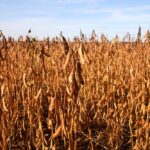Reuters – The U.S. Environmental Protection Agency has slightly shortened the window for farmers in major soybean-producing states to use a weedkiller criticized for drifting away from where it is sprayed. The restrictions make it harder for farmers to use dicamba, sold by agrichemical companies like Bayer AG and Syngenta, after some growers have already












